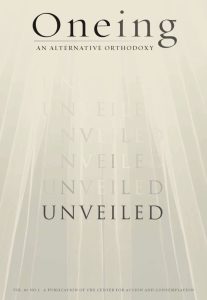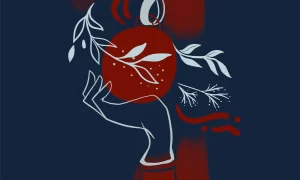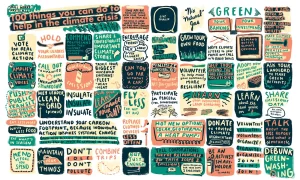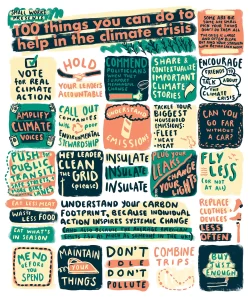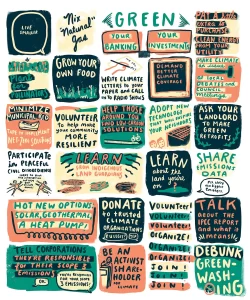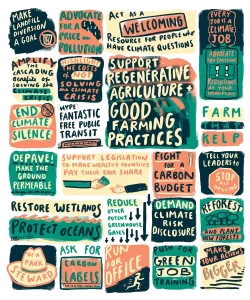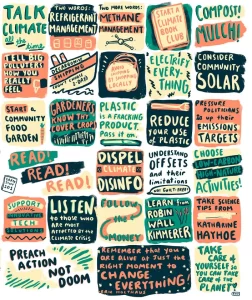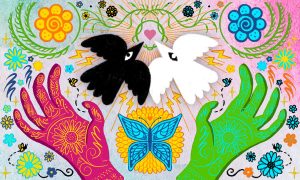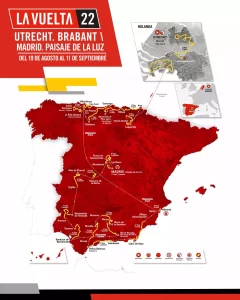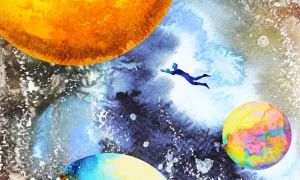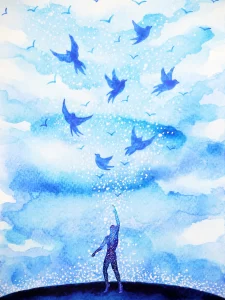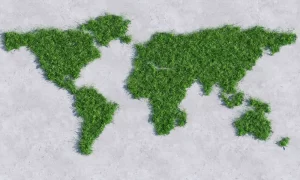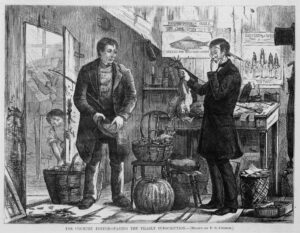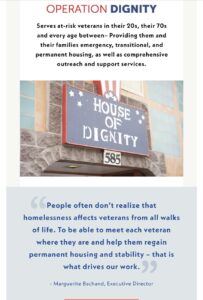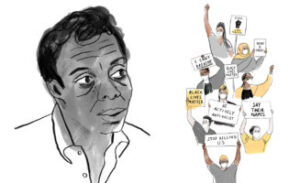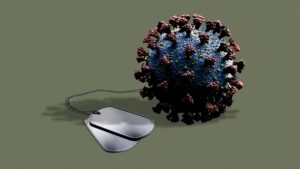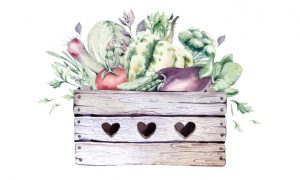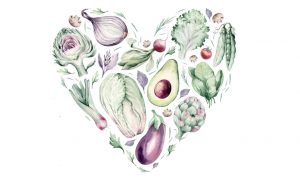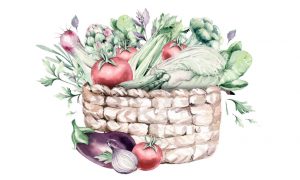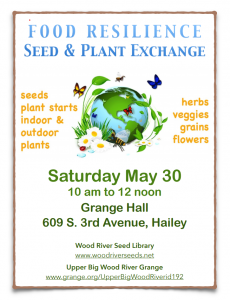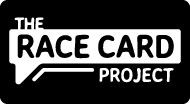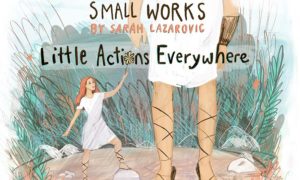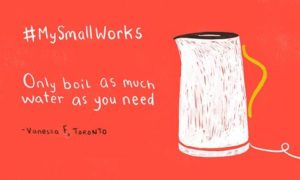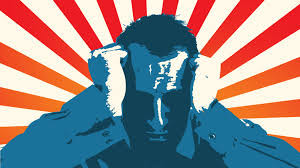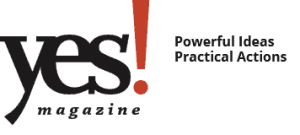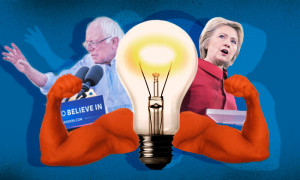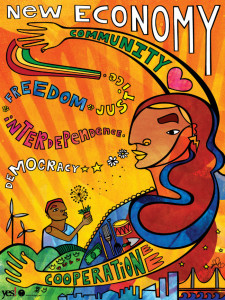YES Magazine
Dayle in Limoux – Day #44
August 18, 2022We are not alone. The wise ones who walked before us have left luminous footprints for us to follow in our own apocalyptic time.
‘It takes a contemplative mind to spend months living and working in relative isolation because of a devastating pandemic—and not lose hope.’
♡
-Mirabai Starr
Julian of Norwich
John of the Cross
More from Mirabai.
‘Mystics see through a lens of paradox: dazzling darkness, beautiful wound, the longing that is the remedy for longing. Paradox points beyond itself to a truth that both transcends and includes logic, a truth that is alive, generative, and whole. Such a dynamic mode of knowing demands our complete attention. . . .
What does a religious woman who dwelt in an anchor-hold during the Middle Ages have to do with you and me today? Julian endured a long and cruel pandemic. The disease ravaged her community and carried off the people that she loved. She learned to shelter in place, focusing on cultivating her interior landscape and sharing the fruits of her wisdom through the window that opened from her cell onto the busy streets of her city (think computer screen and Zoom), where she offered counsel to visitors . . . each day.
And how could a renegade monk, who survived the Spanish Inquisition despite the Jewish and Moorish blood that flowed through his veins, have anything to teach us about flourishing in our own dark nights? John of the Cross illumines the transformational power of radical unknowing. He rekindles our latent longing for union with the Beloved and, through sublime poetry and precise prose, blows on the flames so that they dance back to life in our
beleaguered hearts.
He reminds us that when everything in us wants to rush out and fix the problem of our brokenness, both individual and collective, the wisest and most loving thing to do is to be still, letting go of our attachment to the way we thought the spiritual life was supposed to feel and the sense we assumed it should make.
Once we step out of our own way, into the dark and empty vessel of the soul, “an ineffable sweetness” will begin to rise, permeating and nourishing the quiet earth, uncovering a resurrection we never dreamed possible: a dazzling darkness, a radiant night, a revolutionary newness
of being.’
(This essay, and others, is included in the Oneing/Unveiled book illustrated above.)
Our ancestors, on standby and ready for our inquiry. Reading earlier this morning from YES! Magazine:
Defenders of the system [Capitalism/Philanthropy] cannot rightfully claim they were not warned. There are warnings against overreach and hubris in the founding myths, literature, poetry, and scriptures of nearly every culture on Earth. In Western literature, for example, the monster in Mary Shelley’s Frankenstein (1818), for one, is not the creature but its creator, who refused to take responsibility for what he’d done. Herman Melville’s Captain Ahab in Moby-Dick (1851) is a further warning about the penalties that accompany uncontrolled obsession in pursuit of ignoble ends. Fyodor Dostoevsky’s Grand Inquisitor gave a further warning about the perverse logic of necessity; in The Brothers Karamazov (1879), the Grand Inquisitor says to a silent Christ: “In the end they [the people] will lay their freedom at our feet, and say to us, ‘make us your slaves but feed us.’ They will understand at last that freedom and bread enough for all are inconceivable together … they can never be free for they are weak, vicious, worthless, and rebellious.”
Good essay.
‘Sometime after Adam Smith published ‘The Wealth of Nations’ in 1776, the logic of brute force infected Western economics, informing its underlying proposition that all men (mostly) have insatiable wants that justify tearing up the earth, polluting it, or frying it to death. By this logic, human survival is deemed uneconomical. But why would any even modestly sane person run the risks of destabilizing the Earth’s climate? It is impossible to comprehend the depth of nonsense in waters so turbid.’
The Disaster of Philanthropy and Capitalism
by David W. Orr
C
L
I
M
A
T
E
B R E A K D O W N
Reading about the fires in Algiers, 38 have perished thus far in this rapid and large burning fire. The planet is burning. Gaia is crying for our help.
France 24:
‘Forest fires that ravaged 14 districts of northern Algeria—a country with an already limited amount of forest.’
The country is south of Spain and east of Morocco.
Everyday I feel as though all news and information should rake away anything that doesn’t deserve what should be the planet’s number one priority: C L I M A T E. Imagine if the media focused on climate like they do president #45. I mean, if we don’t have a planet that is inhabitable, and vast majorities of people are migrating to simply live, it probably won’t matter a whole heck of a lot what he did, what he’s going to do, or what he blabbered about at a rally.
Learning that we can all do our part, however small our gesture or effort, like eating less meat, driving/flying less, removing lawns, reuse, change out older appliances (CFC’s), and lastly, hugely, V O T E for candidates who 1. Believe in climate breakdown and 2. Will work to save our planet, release the grip on U.S. fossil fuels, and amplify every step of progress that could heal our planet, collective micro efforts will create shift. WE MUST ‘LOOK UP.’ From YES! magazine:
100 Things You Can Do to Help in the Climate Crisis
In case you needed help getting started.
A New Social Justice: Solutions We Love
[YES! Magazine]
‘To heal ourselves, we must remember that we are a small part of a much greater whole.’
-Adrienne Maree Brown.
~
Buying real estate is France. Some incredible finds and quite affordable, especially when comparing housing prices in the u.s.a. right now. This is fun. A couple of guys bought a village (!) in France.
https://youtu.be/swYlxaqD0MI
More from Julian of Norwich, lyrics based on her well-known and often shared quote:
“All shall be well, and all shall be well and all manner of thing shall be well.”
Receive the gift of healing
from the well of tears;
be washed anew
by grief and sorrowing.
Receive the gift of healing
from our mother Earth,
her deep and dark
and secret verdancy.
Receive the gift of healing
from the shaman’s touch:
the wounded healer’s power
to revive.
Receive the gift of healing
in the arms of love,
embraced in passion
and compassioning.
—
Covid. It is not over. 500 people are still dying every day in the United States. Here in France absolutely no mitigation. Many people are out and about coughing, congestion; could all very well have Covid. Even the woman who own my building, back from the hospital after two weeks, being in a coma and on respirator, will not wear a mask. Or her family. She is getting stronger, her breathing more fluid. Thank, Gaia. Yet she has not fully recovered. So. Doubling down. Again. My heart is so sad knowing how many immune compromised stay in isolation, many away from friends and co-workers…families…because they can not chance being ill. There is still so little known about the disease and it’s long-term effects. From Axios:
‘A new large-scale Oxford University study finds that people who’ve had COVID face increased risk of neurological and psychiatric issues — brain fog, psychosis, seizures, dementia — for up to two years after infection.
- The study found anxiety and depression are more common after COVID, though typically subside within two months of infection, Axios’ Rebecca Falconer writes.
Why it matters: The study, published yesterday in the Lancet Psychiatry journal, is the “first to attempt to examine some of the heterogeneity of persistent neurological and psychiatric aspects of COVID-19 in a large dataset,” an accompanying editorial says.
And Monkeypox, reportedly can infect asymptomatically. And now polio is back due to lack of vaccines in countries like Pakistan and Afghanistan; travelers/migrants can bring those viruses into another country, and many parents have opted not to vaccinate. A man in New York who contracted the polio virus is now paralyzed. Apparently, some of the vaccines…not in the U.S….vaccinate with a ‘live’ virus and that can be problematic when they do travel. This is what reportedly happened in New York, according to one doctor. And with our climate breakdown, will be seeing, and contracting, more viruses. The CDC’s choice to basically eliminate precautions, i.e., physical distancing and isolating when testing positive, is baffling.
VUELTA
CyclingNews:
‘The 2022 Vuelta a España starts on August 19 in Utrecht, Holland, and ends in Madrid, Spain, on September 11. The 21 stages include a team time trial, an individual time trial, several flat stages and nine of the often-steep uphill finishes the Vuelta has become known for.
Two years after the pandemic caused a postponement of the Vuelta a Espana’s Dutch start, Utrecht will finally become the first city in the world to organise the opening stage of all three Grand Tours after the Tour de France in 2015 and the Giro d’Italia in 2017.’
Jusqu’à demain.
✿
Radical Transformation
January 15, 2022“Being fully present to what is happening in the world is a radical act that can transform grief into action.”
YES! Magazine
By Dahr Jamail
In this excerpt from the new anthology “A Wild Love for the World: Joanna Macy and the Work of Our Times,” journalist Dahr Jamail describes how Macy and her work helped him survive profound war trauma and climate grief.
Macy, a scholar and teacher of Buddhism, systems thinking, and deep ecology, is the author of 13 books and a respected voice in movements for peace, justice, and ecology. She originated The Work That Reconnects, a framework and methodology for personal and social change. It is influential work that, in the face of overwhelming social and ecological crises, helps people transform despair and apathy into constructive, collaborative action.
[…]
During one of Joanna’s discussions, she said, “The most radical thing any of us can do at this time is to be fully present to what is happening in the world.” For me, the price of admission into that present was allowing my heart to break. But then I saw how, in the face of overwhelming social and ecological crises, despair transforms into clarity of vision, then into constructive, collaborative action. “It brings a new way of seeing the world, freeing us from the assumptions and attitudes that now threaten the continuity of life on earth,” Joanna said.
[…]
There is more and more social hysteria, greatly aided by the corporate media and its finger-pointing and scapegoating. On one hand, you have the mass shootings, and on the other, a deathlike closing down under the pressures of the moment when you need to just get food on the table.”
Illustration by Benjavisa Ruangvaree.
I felt like little more than a typist for Gaia as the feelings and words flowed out of me, as I bowed to and held in reverence our magnificent planet. With each passing day, it became clearer to me that my work was truly in service to the planet, each chapter an homage to her. And along the way, she brought in Native American elders, which literally changed the ending of the book I had prepared. It was due to my training with Joanna that I knew what was happening and allowed myself to be Gaia’s instrument.
No matter how difficult life on Earth becomes, we will only be able to withstand these times by sharing ourselves with one another. If nothing else, we can bear witness together and not suffer in isolation as the dominant culture prefers. In being a “we,” humans can live as the deeply interconnected consciousness of Earth that we already are, just as Joanna has taught all of her life.
Yes. But what is the ‘we’ now? We are no longer deeply connected, only ideology connected and fractions are deep within each. Jesus spoke of ‘thou’, you, but contemporaneously it is only ‘me’ and perspectivism. ‘We’ know what needs to be done, but can ‘we’, will ‘we’? Hope is nothing more than a gamble, and we have no more chips.
R A D I C A L T R A N S F O R M A T I O N
…desperately needed, as ‘we’ exist in a state of radical uncertainty.
10 years…maybe less.
January 12, 2022“Our life is frittered away by detail. Simplify, simplify, simplify! I say, let your affairs be as two or three, and not a hundred or a thousand; instead of a million count half a dozen, and keep your accounts on your thumb-nail.”
-Henry David Thoreau
YES! Magazine
When Less Is More
by David Korten
“Science tells us that we now have fewer than 10 years to reduce the human burden on Earth or trigger tipping points in Earth’s natural systems from which there is no return. Most discussion centers on the climate emergency, but we also have crises related to air, water, soil, species extinction, and more.
A viable human future depends on living with less. Does that mean sacrifice? Leaving more people behind? Or is this challenge an unprecedented opportunity to achieve a better future for all? The question of how much is enough, the theme of the fall 2021 issue of YES! Magazine, poses a foundational question for our time.
Let us look at several key areas where less could be more.
- Deadly Weapons.
- Mis-/Disinformation.
- Financial Speculation.
- The Bitcoin Con.
- Global Supply Chains.
- Short Stay Air Travel.
- Auto-Dependent Cities.
We face a defining choice. We can hold to course with an economy that grows GDP to provide a few with the opportunity to make a killing as they prepare to escape to outer space. Or we can embrace the current opportunity to transition to an ecological civilization, with a living economy dedicated to supporting us all in making a secure and fulfilling living on a thriving living Earth.”
Full Piece: yesmagazine.org
~
How Much Is Enough?
YES! Magazine
by, Lornet Turnbull
Rebecca Rockefeller and Liesl Clark envisioned back in 2013 when they created Buy Nothing—a gift economy operated on a hyperlocal scale to bring neighbors together through sharing and community.
Neither a group, organization, association, or nonprofit, Buy Nothing is a movement that has doubled in size during the pandemic. It now has more than 4 million participants in 6,500 groups, located in 44 countries across the globe.
“It’s like a radical new economy, except of course it’s an old economy that has been around forever,” Rockefeller says. “We’re just re-presenting it.”
“Here we were studying this very old culture, up to 3,000 years old, while at the same time seeing that the modern folks were using their materials in a way that was so beautiful and eye-opening,” she adds. “The only way these cultures could survive was literally by always ensuring that the weakest were carried along with them.”
[Barter Economy/Wikipedia Image]
Thank you for your service.
November 11, 2020Sacrifice.
Sacrifice.
Sacrifice.
You gave everything. For what? Look at us. Humanity. We’re a mess. We can’t even don a mask because, you know, our rights not to wear one are greater than your right to live.
Homelessness.
Suicide.
Mental health.
Struggle.
But yeah. Thank you for your service. We truly don’t know what it means, as a
C O L L E C T I V E
to take care of our own.
We dishonor you with our actions during this global pandemic.
Some continue to try. ♡
operationdignity.org
~
Yes! Magazine:
“I am just grief stricken by how many Americans are OK with racist dog whistling and white supremacy and cutesy nods to white nationalism. Even if 45 is gone, that all stays. This is who we are.”
A friend, the White mother of a Black child, posted this on Facebook on election night. That last line floored me: This is who we are.”
It is exactly who we are. Since before the birth of this nation.
yesmagazine.org
~
AXIOS
The pandemic’s toll on veterans
by, Ashley Gold
“A number of recent studies highlight the problems facing veterans as the coronavirus pandemic rages on.
- According to one recent survey of 30,000 veterans wounded after 9/11, 52% said their mental health has gotten worse and 49% said their physical health has become worse since they started social distancing during the pandemic.
- Sixty-one percent said they felt more disconnected from friends, family and community, according to the survey by the Wounded Warrior Project.
- Veterans are delaying doctors’ appointments too, with 70% reporting having in-person appointments canceled or postponed. And 40% noted employment difficulties.
- The Associated Press reported in September that military suicides have gone up as much as 20% this year compared to the same period in 2019.A study by the
- Bob Woodruff Foundation this spring said emergent trauma, loneliness due to social isolation, and unplanned job losses creates a “perfect storm” threatening the mental health of veterans.
By the numbers: Beyond the stress caused by the pandemic, coronavirus cases are up among veterans, too. According to the Department of Veterans Affairs, there have been 83,383 cases among VA hospitals with 4,223 known deaths.”
Exhausted. On edge.
Now, as the world heaves a collective sigh of relief (or grief), whatever you’re feeling, wherever this finds you…
Let’s take a moment to remember that the great task of our lifetimes is not to change the world.
Our task is ONLY to transform ourselves …
The world is naturally transformed by our Light.
-Allysha Lavino
Courtney Martin.
‘Since the “map show” of last week—all those blues and reds signifying, well, everything and nothing—we’ve been hearing calls for unity. I get it. I really do. I crave more steady common ground rather than the shifting tectonic plates we’ve all been surfing unsteadily these last four years. I want a news network called Truth that everyone, regardless of political party, actually trusts. Let’s spend some time disagreeing about our values and how to get things done, not the facts, for a change. Let’s log off of social media where our most base emotional wiring is being profoundly manipulated. At this point, I’d rather our commander-in-chief communicated via interpretive dance than twitter.
But as much as I honor our collective desire for kindness, this is not the time for congeniality. This is the time for a fiercer form of moral leadership. Our foundational values need to show up in public—calm, sure, if that feels authentic, but more importantly, uncompromising on questions of basic humanity. We have developed some powerful new muscles the year for tolerating uncertainty, for unvarnished truthtelling, for outraged solidarity; now is not the time to get back to compartmentalization and quiet desperation, violent death and violent denial.
It’s not unity we need. It’s a basic agreement that racism, sexism, ableism, etc. will not be tolerated. There are not two sides on this. There are a million shades of gray on how we live and lead, but there are not and should never be two sides on dehumanization.
And, yes, that means that my work is not to dehumanize those who didn’t vote as I did. My work is to get ever more curious about them, about our current ecosystem of information and the way it has distorted all of our perceptions of truth and trust. My work is to disagree with them out loud, on the page, wherever I need to, whenever I need to—boldly and respectfully.
I am especially invested in doing this with White women right now, having seen that half of those with a similar racial and economic status as my own supported Trump; I am baffled and profoundly sad about this. My job now is to transform that bafflement, that disappointment, into fuel. I am tired of looking at the demographic data the day after an election and being ashamed of the way “my people” voted. But I won’t reject those people. I will pick my chin up and get after organizing with them—figuring out what my gifts are and how I can bring them to bear on this conundrum (the conundrum being that even the dehumanized vote for the dehumanizer).
I see that as work of those who have had the privilege of not watching their humanity be debated. I am not going to ask my Black or immigrant or disabled friends to spend their precious energy empathizing with someone who doesn’t believe they are as worthy as I am. If that’s someone’s spiritual practice, so be it, but to publicly call for all Americans to unify is to ask those who have been systematically and interpersonally dehumanized by racists and xenophobes to invest in them. That’s not just insensitive, it’s emotionally violent—particularly within the context of 400 years of this shit. That’s not their sacred duty. It’s ours.’
To those calling for unity, here is my ask: Stop requesting self-annihilation from anyone. Yes, we need to combat the reductive thinking that is only further entrenched by the “map show.” No, we don’t need to capitulate, compromise, or God forbid, normalize the hatred that has always been part of this country, but was surfaced so painfully this year.
And while we’re at it, stop painting fierce moral leadership as wokeism (looking at you, David Brooks). It’s patronizing and inaccurate. Sure, there is a faction of the progressive movement that is more performance than substance. That’s true of any movement at any time. But there are a huge number of people who put a tremendous amount of effort into taking a stand for basic humanity this year; we even risked our own health, the health of our families, to show up at protests and work the polls. We donated money at a time when money was already tight. We talked to our children, however clumsily, about the brokenness of the world. We didn’t do it for woke brownie points. We did it because something intrinsic to our very souls resists the dehumanization of others.
We must not parody that, or call for its politeness. We must nurture and grow and honor that. We must push progressive White America to look at the places where hypocrisy and neglect live in our own lives, not just point the finger at Trump voters. We’re coming to the close of a year of painful unearthing; don’t dishonor that with pavement of politeness.
—
If you are a White person on this journey to figure out how to organize with other White people, check out my bud Garrett Bucks’ new Barnraisers Project, Showing Up for Racial Justice, and/or Integrated Schools.
@courtwrites
courtney.substack.com
Sharing sustenance.
May 12, 2020Instead of Buying Guns or Hoarding Food, Let’s Feed Each Other
YES! Magazine/Solutions Journalism
by Michele Bigley
From my patio in Santa Cruz, California, I watched a scrub jay deliver a peanut shell to its oak-tree home. My neighbor hollered hello from the street below, explaining that she was afraid to go to the store for groceries. “A person was held at gunpoint at the Target,” she said. “Everyone’s going crazy.”
My grandparents had “war gardens” in the 1940s, and small, potted remnants from that time took root on their patios well into their golden years. I’d often asked them to teach me how to grow veggies. But they argued that because grocery store shelves were fully stocked again, they didn’t think it was necessary to teach me how to put in the work of growing my own food.
Yet now our local farms have waiting lists for their Community Supported Agriculture weekly deliveries.
We can plant seeds that take a little weight off our overburdened food system and grocery store workers.
Inspired by all this generosity, I wanted to go beyond simply planting a victory garden for my family’s sustenance. I wanted the sustenance to be shared, so I sent out a blast on Nextdoor.com. Within minutes, people offered up compost bins, some more seeds and soil, starter pots. My septuagenarian neighbors brought over tools, advice, and veggie starts. Another guy I didn’t even know was scavenging scrap wood from a construction site nearby; when I asked about how to make a garden bed, he lugged over some wood, and constructed one in my yard.
The retired crisis therapist across the street noticed the raised bed and said, “In the news, we’re seeing the worst of humanity right now, but around us we’re experiencing extreme acts of kindness, too.”
Many Americans have been raised with this ethos of individualism. I, too, was taught to take care of my family above all else. With the threats of joblessness and hunger in every community, I get that urge to protect what’s ours, especially when we’re terrified that a stranger’s cough can land us in the ICU.
But in the 1930s and 1940s, 20 million Americans stepped up in a time of great global terror. They planted gardens in abandoned lots, on patios, and on rooftops. Today, too, we have the potential to shift how we engage with our world. In fact, social distancing requires it. We can broaden our perspectives and open our hearts to people with whom we might share nothing more than proximity. They will be the ones there for us in crisis. They will deliver chicken soup if we’re sick. They will check in on us if they don’t see us out and about. And they will let us know when the grocery store finally has some Clorox wipes.
Now six weeks into our shelter-in-place, the spinach and strawberries, tomatoes and kale, cucumbers and peppers are sprouting. When I called my neighbor to revel in these tiny green victories, she told me to look on my front stoop. There, I found a pack of toilet paper
Blaine County IDAHO Local Food Alliance
sunvalleyinstitute.org
DIGITAL FOOD GUIDE
Help us connect you with farms and ranches, farmers markets, and restaurants serving locally grown food! The new print version of our 2020 Wood River Valley Locally Grown Guide will hit local magazine stands, visitors’ centers and other regional venues in a matter of days. Now, we are updating our online food guide to include all the same business and non-profit listings, visuals and links, so community members and visitors can find local food with a few simple clicks.
6 words at a time.
September 14, 2018If you were asked to sum up your thoughts about race in six words, could you do it?
Eight years ago, Michele Norris, former host of NPR’s All Things Considered, asked people attending the book tour for her 2010 memoir, The Grace of Silence, to do just that.
The exercise was meant as a conversation starter, a way to engage people on the uncomfortable subject by having them write their thoughts on postcards and then share them with others—directly and online. But Norris’ Race Card Project has become much more.
Businesses, churches, and other institutions have used it to facilitate uneasy discussions around race.
The idea is even more relevant today. Nearly two-thirds of Americans say racism remains a problem in the United States, according to a recent NBC poll. In fact, almost half of those polled say they believe race relations are getting worse.
In addition to helping start difficult conversations, the postcards and their backstories also serve as a sort of time capsule, marking specific events: The first Black president, Black Lives Matter, the Muslim ban, understanding of White fragility, and the most openly racist president in recent history.
“I think it has great value over time,” said Norris, who now heads up a program called The Bridge at Aspen Institute, which focuses on race, identity, and inclusion. “I’ve done a lot of high-order research. What I would give to have an archive like this to better understand the lived experience of race and identity from the 1930s, or 1940s, 1960s, or even the 1970s, which wasn’t that long ago.”
“And this project, this crazy project that started on the third floor of my house, I think will provide a unique window for people who are trying to understand the moment that we’re living in right now,” she says.
Full piece:
Little things do matter.
Sarah Lazarovic
“I sign petitions. I refuse plastic bags. I try to eat mostly vegetables. I turn off the light when I leave a room. I am one of those people whom other people roll their eyes at. So I was delighted when fun illustrator Sarah Lazarovic suggested a regular YES! feature called Small Works, which would prove—charts! science!—that our little individual actions really do help create big changes.
P.S. We want to know what your small actions are! Sarah will select a few to illustrate and show you how important your small works are.”
Post Election 2016
November 12, 2016“As did many of you, I watched Tuesday night’s returns with a mix of horror and fear. Fear for our warming planet, for our sense of decency, for our future. Those feelings are real and justified, so we should all take the moments we need to understand what has just happened. And then? There is much to be done.
Here are 10 things I will do to ready myself for what lies ahead. You may find them helpful, too.”
1. Ground yourself
Breathe deeply. Go to a favorite spot in nature and really be there. Meditate. Find a favorite poem, reading, religious passage that has helped you before and read it quietly.
2. Allow the grief
Don’t suppress your feelings of fear, dread, anger, grief. Just allow them. But don’t wallow there; move on when you’re ready.
And allow other feelings to arise, too—they may surprise you.
3. Be with friends
This is a time for community. Share your feelings, your insights, your fears—and, especially, your hopes. Hug a lot.
4. Take a media break
Keep up with the news, but turn off the endless rehashing of painful stuff that you already know.
5. Take care of the children
Yours, neighbors’, grandchildren. They will sense your fear, and the very young won’t understand it. Reassure them that they are safe.
6. Reach out to anyone threatened
There are people who are especially afraid: immigrants, Muslims, Blacks, Latinos. Speak up and show solidarity.
7. Don’t dismiss the Trump voters
Remember that many of his supporters voted from a place of anger and despair about many of the same things for which you feel anger and despair: all the wealth going to the already wealthy, corporations getting all the breaks while everyone else feels stiffed, political power wielded by the very rich.
8. Think local
I’ll bet on Tuesday night there was something (maybe many things) on your local ballot to celebrate. Embrace them. And find the many ways in addition to electoral politics to make change in your community, your town, your state.
9. Take care of yourself
Yes, eat some comfort food—but then take those walks, do those yoga stretches. The whole world needs your energy, your health, your vision. There is much to be done.
10. Take the long view
Martin Luther King’s words can hold us: “The long arc of history bends toward justice.”
Wait. It makes sense.
June 18, 2016‘I’m Sticking with Sanders – – and Voting for Clinton’
Bernie Sanders has the best policies. But Hillary Clinton has the chops to advance a progressive agenda—if we make her.
I see a possible scenario that can make a Clinton win a blessing. It is a long shot, but the logic is simple.
1. Few, if any, Americans have the broad insider experience that prepares Clinton to carry out the basic duties of the presidency—and to advance a progressive agenda if forced to do so by the persistent demands of a powerful progressive political movement.
2. Sanders has activated millennials and independents and energized a powerful progressive political movement with the potential to hold Clinton to a progressive agenda.
3. Trump is fracturing the Republican party and energizing his opposition. These two factors could flip control of Congress. Combined with a Democrat in the White House, that would assure a progressive shift in control of the Supreme Court.
4. These factors together create a moment of historic opportunity.
[…]
We also know, of course, the Clinton family’s history of aligning with Wall Street and the corporate establishment. To win against Trump, Clinton will surely continue to run against the corporate establishment. Once in office, however, she could easily slip into her old ways.
This is where the social movement that Sanders energized becomes so essential.
‘Everyone is mixed.’
March 10, 2016‘Race is a social construct.’
From YES! Magazine
Filmmakers offer a glimpse into the “gray area” of being mixed race in America.
‘In this video from Evoking the Mulatto—a multiplatform project exploring black mixed identity in the United States—young people talk about the words used to describe their mixed race heritage and how those words affect their lives and sense of self.
Of course, the question is twofold. How do mixed race people perceive themselves, and how do others perceive them?’
Transformative Economy
January 10, 2016‘…the new economy is not about ‘projects’ existing alongside the current unjust system—but about working toward transformative change for all.’
